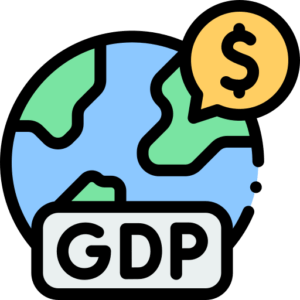How the Fitch Rating system impacts US economy today
The Fitch Rating system is a critical part of the US banking and economic landscape. It affects both retail investors and large market players, as it provides an assessment of debt securities, giving insight into their creditworthiness and likelihood for defaulting on loans or repaying bonds issued. As such, both stock traders and advisors rely heavily on this ratings system to make informed decisions regarding investment opportunities in any sector. In this blog post, we’ll discuss how the Fitch Rating system impacts the US banking system today while also exploring its implications for overall economic stability across the nation. Read on to find out more!
Overview of the Fitch Rating System and its Role in US Banking
The Fitch Rating System is a vital part of the US banking system. It measures the creditworthiness of banks and determines the likelihood of a bank defaulting on its financial obligations. Fitch Ratings, one of the largest credit rating agencies in the world, assigns banks a credit rating based on their financial stability, asset quality, management, and other risk factors. The Fitch Rating System provides investors with an unbiased and independent evaluation of a bank’s financial health, which helps them make informed investment decisions. As the US banking system continues to evolve, the Fitch Rating System will remain a key player in ensuring the stability and growth of the financial industry.
How Fitch Ratings are Used by Investors to Determine Trades
Investors are always on the lookout for valuable insights that can help them make the right trading decisions. One such tool that they use is Fitch Ratings, which offers independent credit ratings, research, and analytics to various sectors of the economy. These ratings provide investors with a unique perspective on the creditworthiness of companies and individual securities, allowing them to assess the risk associated with each trade. Understanding how Fitch Ratings work and what they mean for the market can be critical to investors’ success, and can help them make well-informed and cautious trades. As a result, Fitch Ratings have become an essential resource for the financial community, allowing investors to better navigate the complex world of modern investing.

Impact of Fitch Ratings on Interest Rates in the Markets
Fitch Ratings is one of the major players in the financial industry, with a well-known reputation for providing credit ratings to various types of businesses and financial institutions. One of the most significant impacts that Fitch Ratings has on the economy is the effect it has on interest rates in the markets. When Fitch Ratings downgrades a credit rating, it can lead to an increase in interest rates for that particular company and even the market as a whole. The rationale behind this is quite simple – a lower credit rating means that the company is perceived to be a higher credit risk, and thus investors will demand higher rates of return to compensate for the added risk. On the other hand, an upgrade in credit rating can have the opposite effect, as investors are more willing to lend at lower rates due to the increased confidence in the company’s ability to repay the loan. In conclusion, Fitch Ratings plays a critical role in shaping the financial landscape by influencing interest rates and consequently, impacting both businesses and consumers.
The Effect of Fitch Ratings on U.S. Banks and the Overall Economy
For the banking industry, few things carry more weight than Fitch Ratings. This global credit rating agency has been closely monitoring U.S. banks for years, assessing their creditworthiness and likelihood of default. Its ratings play an instrumental role in determining how much banks can borrow, how much interest they pay on that debt, and ultimately, the health of the entire financial system. But the impact of Fitch Ratings goes beyond just the banks themselves. Its assessments can send ripples through the broader economy, affecting everything from interest rates to consumer confidence. All in all, Fitch’s influence is significant, and it’s crucial that we understand the extent of its reach in order to appreciate its effects on the U.S. banking industry and beyond.
An Explanation of Why Fitch is an Important Measurement in Assessing Investment Risk
Investing can be a risky business, and assessing that risk is key to making informed decisions. That’s where Fitch, one of the world’s leading credit rating agencies, comes in. Fitch provides independent and objective evaluations of the creditworthiness of companies and investments, taking into account a range of factors from financial stability to industry trends. This means that investors can use Fitch’s ratings and a technical analysis to determine the level of risk associated with a particular investment, helping them to make more informed decisions that align with their financial goals and risk tolerance. In short, Fitch’s measurement of investment risk is an important tool for anyone looking to make smart investments in today’s complex financial landscape.

What Every Investor Should Know About the Fitch Rating System
Investing can be overwhelming, especially when you’re trying to navigate the intricate world of credit ratings. Fitch Ratings is one of the big three rating agencies that helps investors determine the creditworthiness of different investments. But what exactly is the Fitch Rating System? Essentially, it’s a grading system that measures the likelihood of a borrower defaulting on their debt. This system ranges from AAA, indicating a strong likelihood of repayment, to D, indicating that default has already occurred. Understanding how Fitch Ratings work can be a valuable tool for investors looking to make informed decisions about their portfolios. So, whether you’re a seasoned investor or just starting out, it’s worth taking the time to educate yourself about the Fitch Rating System.
In conclusion, it is clear that the Fitch Ratings system is a powerful tool used to gauge the stability and reliability of the U.S. banking system and overall economy. Investors use Fitch ratings to determine trades and the impact of this can be seen on the interest rates in markets. All investors should take time to understand how Fitch ratings are assessed, what they mean for their investments, and why they are an important measurement in assessing risk. By understanding this rating system, investors can ensure their investments are as safe as possible. As we settle into 2021, economic conditions remain uncertain meaning every investor needs to do what they can to ensure their portfolio is sound. To stay informed about economic changes and stock market updates quickly and easily, click allow for push notification updates directly from our financial experts.



